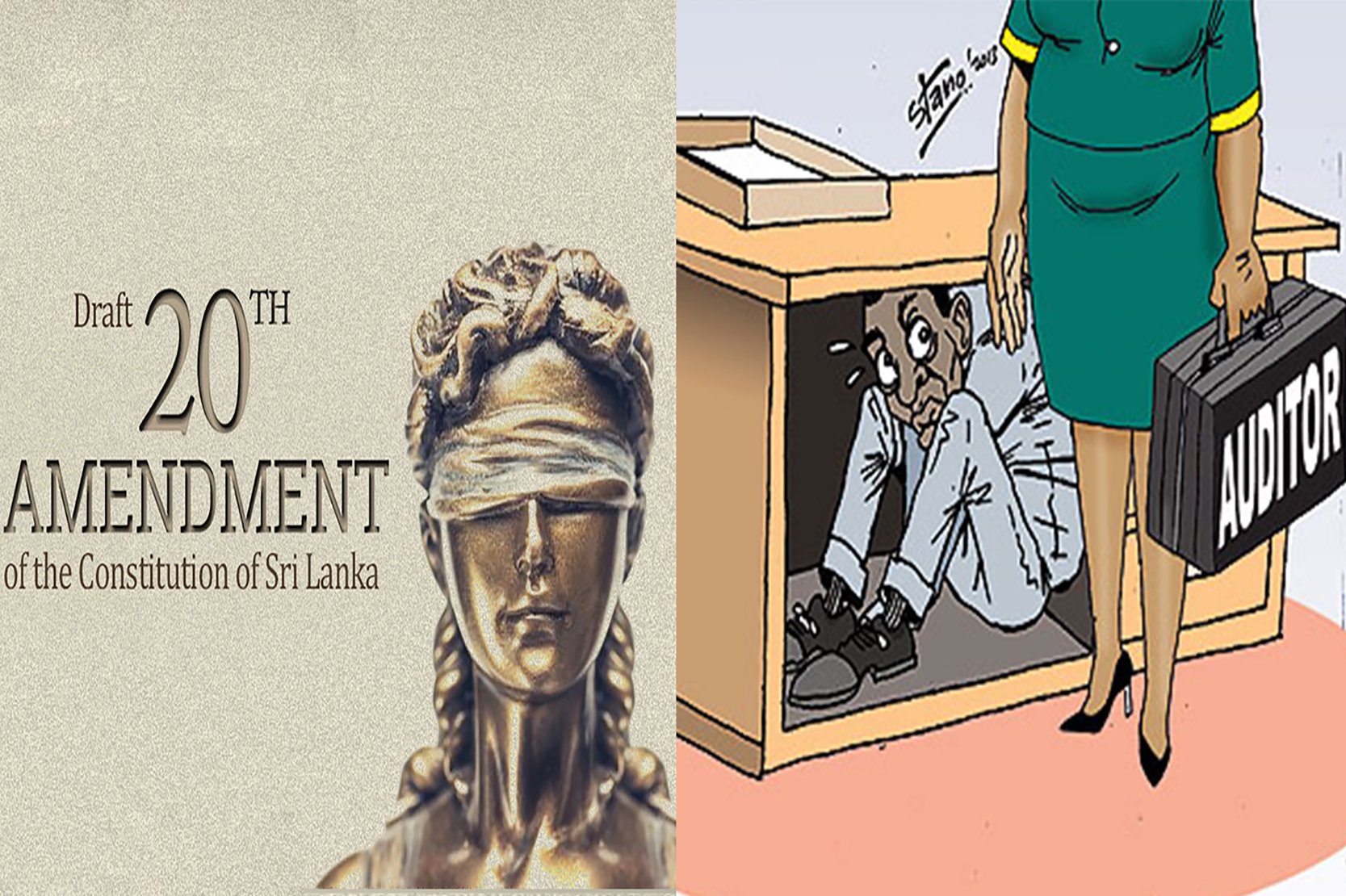20 වැනි ආණ්ඩුක්රම ව්යවස්ථා සංශෝධන කෙටුම්පත ඔස්සේ විගණකාධිපති බලය
අඩු කිරීමට සුදානම් වන්නේ, හොරහිත ඇති පාලකයින් විගණනයට කෙරෙහි දක්වන බිය නිසා බව ජාතික ජන බලවේග පක්ෂ නායක පාර්ලිමේන්තු මන්ත්රී අනුර කුමාර දිසානායක පවස යි.
අද (21) දින දේශපාලන පළිගැනීම් පිළිබඳ සොයා බලන ජනාධිපති පරීක්ෂණ කොමිසම හමුවට පැමිණි ඔහු මාධ්ය වෙත අදහස් දක්වමින් මේ බව සඳහන් කළේය.
"ජනාධිපතිවරයා, අගමැතිවරයා තමන්ගේ ලේකම් කාර්යාල විගණනයෙන් අයින් කරනවා නම්, තමන්ගේ දේශපාලනික සභාපතිවරු දාපු සමාගම් ටික විගණනයෙන් අයින් කරනවා නම් ඒ කියන්නේ කුමක්ද? එකපැත්තකින් විගණනයෙන් අයින් කරනවා. අනික් පැත්තෙන් අධිකරණයට යන්න බැරිවෙන්න මුක්තිය ගන්නවා.මෙය මොනතරම් යුක්ති සහගත ද? ශිෂ්ට ජනාධිපතිවරයෙක් නම් කළ යුත්තේ තමන්ගේ මූල්ය භාවිතාව පිළිබඳ විගණනයට ලක් කිරීම. ඒ සඳහා බාධාවන් තිබෙනවා නම් ඒ බාධාවන් ඉවත් කිරීම. ඒක තමයි යහපත් පාලකයන්ගේ ලක්ෂණය. හැබැයි හොර හිත තියන පාලකයෝ, වංචාව ඔලුවේ හංගගෙන ඉන්න පාලකයෝ හැමවෙලාවෙම බියයි විගණනයට. ඒ නිසා තමයි මේ අයින් කරන්න සුදානම් කරලා තියෙන්නේ."
මාධ්යවේදියා: 20 හොඳ නැතිනම් ආණ්ඩුවේ ඇමතිවරු කියනවා යන්න පුළුවන් උසාවි කියලා...
"උසාවියේ දී බලන්නේ ඒක යුක්ති සහගත ද නැත්ද කියන එක නෙවෙයි. උසාවියේ දී පරික්ෂා කරලා බලන්නේ එය සම්මත කරන්නේ පාර්ලිමේන්තුවේ තුනෙන් දෙක සහ ජනමත විචාරණය කියන කාරණය විතරයි."
මාධ්යවේදියා: ආණ්ඩුව කියන්නේ 20 ගේන්න තමයි ජනතාව තුනෙන් දෙකක් දුන්නේ කියලා...
"මම හිතනවා 20 තියෙන දේවල් ඡන්දෙට කලින් කිව්වා නම් ඕවා ලැබෙන්නේ නෑ කියලා. ඒ කියන්නේ මැතිවරණයට කලින් කිව්වා නම් ජනාධිපතිවරයාගේ මුක්තිය අයින් කරනවා කියලා, රාජ්ය සමාගම් විගණනය කරන්නේ නැහැ කියලා, හදිසි පනත් ඕන වෙලාවක පාර්ලිමේන්තුවට දාන්න පුළුවන් කියලා, පුරවැසියාට නඩු පැවරීමේ අයිතියක් නැතිවෙන විත්තිය, ද්විත්ව පුරවැසියන්ට බාධාවකින් තොරව අපේ රටේ ජනතා නියෝජිත ආයතනවලට තරග වැදීමේ අයිතිය තහවුරු කරනවා කියලා, ඇමති මණ්ඩලයේ 30 සීමාව අයින් කරනවා කියලා, නියෝජ්ය අමාත්යධුර ප්රමාණය 40 සීමාව අයින් කරනවා කියලා මේ ප්රතිපලය ලැබෙන්නේ නැහැ.ඒ නිසා මේ ප්රතිපලය අරගෙන තියෙන්නේ ජනතාවගෙන් හිස් කඩදාසියකට අත්සන අරගෙන. ඒ අත්සන මත තමයි මේ ලියවිල්ල සකස් කරලා තියෙන්නේ."
මාධ්යවේදියා: ඒ කියන්නේ නංගි පෙන්නලා අක්කා දීල ද?
"ඊටත් වඩා බයානකයි. ඒකෙ නම් අක්කා හරි හම්බ වෙනවනේ. මේකේ එහෙම වත් නෑ."

